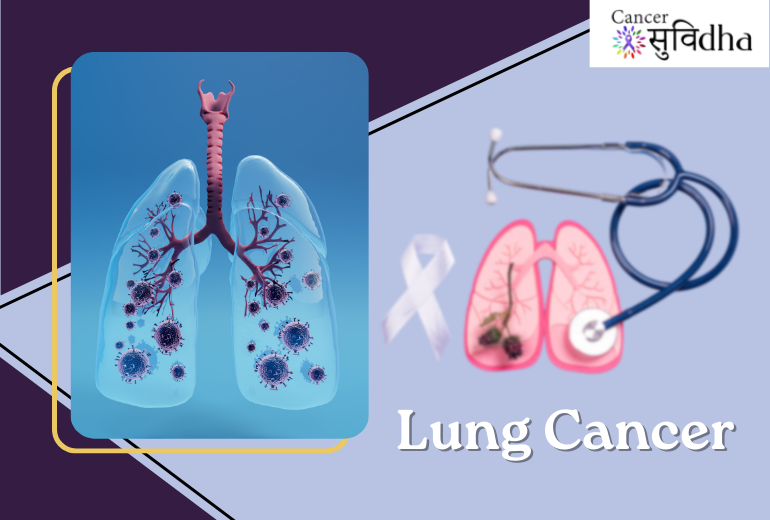Service Detail

Lung Cancer
Lung Cancer Specialist Doctor in Delhi
Lung cancer is a serious disease that claims thousands of lives each year. Understanding the risks and available treatments is crucial for making informed decisions about your health and seeking the right lung cancer specialist in Delhi. This article will provide insights into lung cancer, including its types, stages, symptoms, causes, prevention strategies, and treatment options, helping you navigate this challenging condition with knowledge and confidence.
Types of Lung Cancer
Lung cancer primarily comes in two types:
1. Small Cell Lung Cancer (SCLC): This type is more aggressive, growing and spreading quickly.
2. Non-Small Cell Lung Cancer (NSCLC): The more common type, it tends to grow and spread at a slower rate.
Stages of Lung Cancer
Lung cancer develops when cells in the lungs grow uncontrollably. The stages of NSCLC are:
- Stage 0: Known as carcinoma in situ, this stage involves abnormal cells confined to a specific area of the lung.
- Stage I: The tumor is no larger than 3 centimeters and hasn’t spread outside the lung.
- Stage II:The tumor is larger than 3 centimeters but hasn’t spread to nearby lymph nodes or organs.
- Stage III: Considered advanced, the tumor may vary in size and has spread to nearby lymph nodes or organs.
- Stage IV: The tumor has metastasized, spreading to distant parts of the body.
Signs and Symptoms
Lung cancer symptoms often include:
- Persistent cough that worsens over time
- Shortness of breath or easy fatigue
- Chest, shoulder, or back pain, especially during coughing
- Hoarseness or changes in the voice
- Unexplained weight loss of 10 pounds or more
- Symptoms related to metastasis, such as bone pain, headaches, or fatigue
Causes
Smoking is the leading cause of lung cancer, with the risk increasing based on the duration and intensity of smoking. Other causes include:
- Exposure to secondhand smoke
- Radon gas exposure
- Asbestos exposure
- Air pollution
Prevention
To reduce the risk of lung cancer:
- Avoid smoking and exposure to secondhand smoke.
- Maintain a healthy diet and exercise regularly.
- Limit exposure to harmful chemicals and pollutants.
- Get regular checkups and screenings, especially if at high risk.
Treatment
Lung cancer is treatable, especially if detected early. Treatment options include:
- Surgery: To remove the tumor, especially in early-stage NSCLC.
- Chemotherapy: To target and destroy cancer cells, often used in later stages.
- Radiation Therapy: Uses high-dose X-rays to destroy cancer cells, sometimes combined with other treatments.
- Targeted Therapy and Immunotherapy: Newer treatments often used in advanced stages of the disease.
Treatment by Stages:
- Stage I NSCLC: Surgery is usually the primary treatment. Chemotherapy may be recommended if there's a high risk of recurrence.
- Stage II NSCLC: Surgery to remove part or all of the lung, followed by chemotherapy.
- Stage III NSCLC: A combination of surgery, chemotherapy, and radiation therapy.
- Stage IV NSCLC: Treatment may involve chemotherapy, radiation, surgery, and newer therapies like immunotherapy.
Lung Cancer Diet
A balanced diet plays a crucial role in cancer treatment and recovery. Here are some dietary tips:
1. Fruits and Vegetables: Aim for at least 5 servings daily. Fresh, frozen, or canned all count.
2. Lean Protein: Include sources like chicken, fish, tofu, or beans.
3. Limit Sugary Foods: Opt for water, unsweetened beverages, and low-sugar fruits like berries.
4. High-Fiber Foods: Whole grains, beans, legumes, fruits, and vegetables help with digestion and may reduce cancer risk.
5. Smaller, Frequent Meals: If treatment affects appetite, smaller meals throughout the day can be easier to manage.
Foods to Avoid
Certain foods can increase lung cancer risk, including:
- Processed Meats: High in nitrates, linked to cancer.
- Red Meat: High in saturated fat and cholesterol.
- Smoked Foods: Contain harmful chemicals.
- High-Fat Dairy: Can clog airways and impair breathing.
- Canned Goods: Often high in sodium and harmful chemicals.
- Artificial Sweeteners: Linked to an increased cancer risk.
By staying informed and consulting with a lung cancer specialist in Delhi, you can take proactive steps to manage and treat lung cancer effectively.
